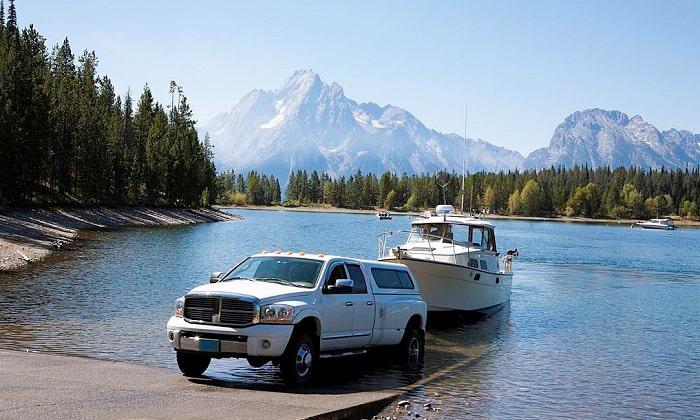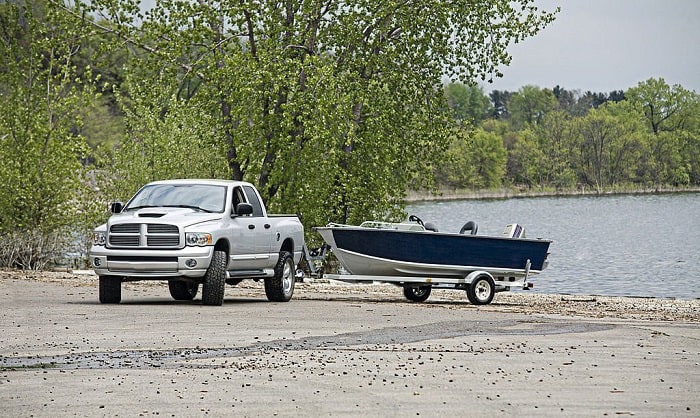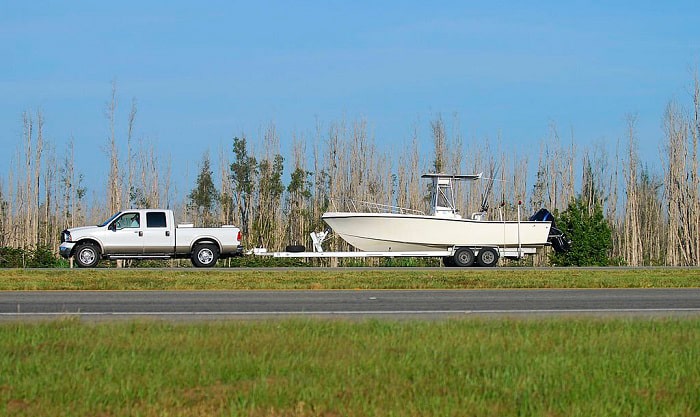How much towing capacity do I need for a boat? First and foremost, you need to pay attention to four factors: the GVWR (Gross Vehicle Weight Rating) of both the trailer and towing vehicle, GCWR (Gross Combined Vehicle Weight Rating), tongue weight, and the vehicle’s curb weight. In some vehicles, the towing capacity information is provided in your towing vehicle’s VIN sticker or the manufacturer’s website or manual.
To keep things simple, determine the towing capacity by subtracting the curb weight along with the total weight of your additional cargo from your GCWR. Keep the total weight below 80% of that total figure. You also shouldn’t exceed the payload capacity, which can be determined by subtracting the curb weight from the GVWR of the tow vehicle.
Read on for a more detailed explanation.
Table of Contents
- So What Do GVWR, GCWR, Tongue Weight, and Curb Weight Stand for
- Know the Difference Between Towing Capacity and Payload Capacity First
- Look for the Towing Capacity With the Help of VIN
- Otherwise, It’s Off to the Weighers for You
- At Best, Most Boats Already Give You an Idea if Your Vehicle Is Fit to Tow It or Not
- Is There an Easier Way to Determine Towing Capacity? Like a Chart or Something
- Conclusion
So What Do GVWR, GCWR, Tongue Weight, and Curb Weight Stand for
- GVWR – Represents the total weight that includes the curb weight of the towing vehicle along with the passengers, gas, gear and accessories, and the trailer’s tongue weight.
- GCWR – This is the sum of the weights of the tow vehicle, plus cargo, and the trailer with the boat and additional gear on it. This should always be considered along with the vehicle’s payload capacity.
- Tongue Weight – Refers to the weight from the tow vehicle to the tongue or gooseneck on the trailer.
- Curb Weight – Stands for the total weight of a vehicle or trailer with all gear, amenities, and the boat’s weight considered.
Know the Difference Between Towing Capacity and Payload Capacity First
People often confuse these two. To me, the simplest way to differentiate one from the other is this. Towing capacity pertains to how much weight it can pull, while payload capacity deals more with the total weight, including cargo, it can carry. Both are important when determining the towing capacity needed for a boat, and it’s equally vital to separate one from the other.
Why? Because some car manufacturers tend to include the payload capacity in the supposed total towing capacity of the vehicle. For instance, in the instruction manual of my 2019 Chevy Silverado, the alleged towing capacity is 13,900 pounds when in reality, and based on my calculations, it’s actually 11,200 pounds.
Look for the Towing Capacity With the Help of VIN
You often don’t have to have your trailer and car or truck weighed to determine the curb weight of either one if you do a quick search on their VIN stickers. I consider this the most straightforward way since this information includes both GVWR, GCWR, and other vital parameters (e.g. cargo capacity) you need to determine the towing capacity you’ll have to handle. Usually, they are placed on the left portion of the trailer.
If you can’t find a sticker on your vehicle, I suggest you try looking it up on this site. Again, once you get the number, be sure you don’t go over 80% (or 85% max) of the total towing capacity of the vehicle. Moreover, just be sure the sum of your fully-loaded trailer (boat included) doesn’t exceed the vehicle’s GVWR.
In the end, the more cushion you have, the better. And based on my experience, I tend to not have to mind the usual issues like trailer sway when speeding up and a generally uncomfortable trailering experience if I do this.
Otherwise, It’s Off to the Weighers for You
If you can’t find the VIN label or information online, the most reasonable step to take is to have your truck and trailer with your boat on it weighed at your local truck scale. In this case, you’ll need to drive and weigh your pickup truck and the loaded trailer onto the scales consecutively.
This is one effective way to calculate your tongue weight as well, so I really recommend you don’t skip this if you haven’t got any other options left.
- Calculating the Safe Towing Capacity
Drive your towing vehicle to the scales, including extra gear, passenger, or other items you will be taking along inside the said vehicle. This would give you the curb weight, and you need to deduct it from the vehicle’s GVWR to get the towing capacity.
If, for example, you have a vehicle with a GVWR of 10,000 pounds and a curb weight of 5,000 pounds, then that only leaves you with 5,000 pounds as the gross towing capacity. Following trailering safety guidelines, 80% of that is 4,000 pounds, which should be the maximum limit you’ll have to carry.
- Calculating the Load Limit or Payload Capacity
Let’s say the towing capacity boat isn’t really available, you can’t find a credible source, or you just want to be 100% sure that your vehicle will be able to handle all the extra weight. Another way to make sure you’re safe is to know the trailer’s load limit.
In the end, it’s reliable simply because it also considers the GVWR of the trailer. As long as you don’t go over it, then you’re good. Start by determining the curb weight of the trailer. Do this by driving your trailer over the scale and then detaching it.
Afterward, deduct the figure you got from the GVWR of the trailer. The resulting total will be the total cargo capacity or payload capacity you have left. You shouldn’t go over it and leave extra cushion to ensure a comfortable ride. You’ll most probably be surprised at how little payload capacity you’ll have left after your calculations!
- Calculating the Tongue Weight
Get the weight of the trailer with it still hooked up to your towing vehicle. Then, detach it from the hitch and get its weight again. Getting the difference between these two figures is one way of knowing the trailer’s tongue weight. Otherwise, you can just deduct 10% or 15% from your trailer’s gross weight.
Knowing the total tongue weight you’ll have to deal with will tell you whether your trailer’s hitch will be able to handle the trailer’s weight or not. In the case of my own towing vehicle, for example, it’s indicated on the hitch’s sticker that it can manage up to 2,000 pounds.
In most cases, the total tongue weight is readily determined by the class of the vehicle you’re using. The highest class, Class V, can usually handle a maximum of 1,700 to 2,000 pounds, for example.
It’s important to point out that the tongue weight capacity of your towing vehicle is equally crucial since lugging weights that are either too light or heavy will affect how you drive your vehicle and may even damage it. It could be difficult to brake if the tongue weight is too heavy, for one. Too light is just as bad since it often leads to trailer sway.
At Best, Most Boats Already Give You an Idea if Your Vehicle Is Fit to Tow It or Not
For instance, the average weight of the ever-popular deck boat is a little over 3,000 pounds. That immediately crosses out medium SUVs and two-wheel drive vehicles from the equation, which can only handle 1,000 to 2,000 pounds at most. That leaves us with heavy-duty pickups and full-size trucks that can do just fine with weights going past 5,000 pounds.
That’s not to say that there aren’t lighter vessels out there like skiffs weighing only 800 pounds. Now, these junior vessels would pair just right with the mid-sized vehicles I mentioned above. Again, this only highlights the importance of knowing the exact towing capacity you’ll be dealing with.
Is There an Easier Way to Determine Towing Capacity? Like a Chart or Something
Everybody likes charts because they’re to-the-point, especially when it comes to knowing detailed information like this. While I don’t encourage relying on one since they only provide estimates, they’re well worth going over since they also reveal the exact towing capacity of a particular. The boat towing capacity chart shared by Boat U.S. is a good example of it.
However, as you can see, the list is limited to a number of vehicles only. Also, you can’t be sure whether the indicated figure includes the payload capacity or not.
Conclusion
To summarize my answer to everyone’s question, “How much towing capacity do I need for a boat?” look at your vehicle’s manufacturer’s manual to know its exact towing capacity or take the time to have it weighed and calculate the needed weight figures from there, the tongue weight included. When in doubt, take the time to perform the math because it will only ensure your and everyone’s safety on the road.
Keep sufficient cushion so your trailering will be a breeze every time. Happy trailering and sailing!

“My intention from the first day establishing Boating Basics Online is to provide as much help as possible for boaters who want to experience a first safe and convenient trip. So feel free to join us and share your beautiful journeys to the sea!”



